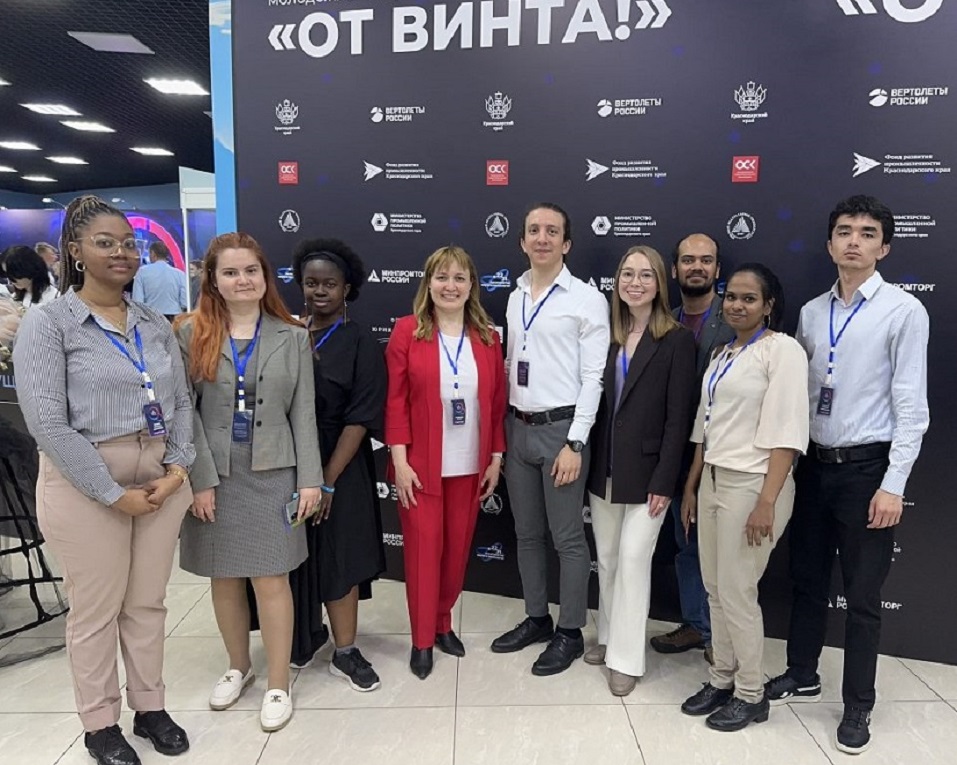RUDN University medics and economists took part in the XVIII International Festival of Youth Scientific and Technical Creativity "Ot Vinta"

Institute of Medicine
Project “International Research Team: Learning to Work Together (International Medical Science Incubator)”.
Academic supervisor — Elena Kaverina, Associate Professor of the Medical Institute.
What is the benefit of your project and why did you choose this topic?
On the one hand, we want to train scientists from school and university so that they can actively develop medical science at an international level. On the other hand, we propose to use the experience of international research teams. At university, we could work with students and scientists from different countries. Our team brings people from all over the world: Europe, Asia, Africa, Latin America, the Middle East, a true friendship of peoples! Working in an international research team gives us invaluable experience, each participant brings something different to the table.
What is your team’s “scientific” dream?
We want as many young people as possible to be actively involved in science, to become innovators. We want to make science attractive to a wide range of potential young scientists and create the necessary conditions for its development.
How will your project make the world a better place and help people?
The more scientists, the better quality of life for everyone due to their research and development. Science should be for life.
The team:
- Musonda Ketura (Zambia) — “General Medicine”, V course;
- Jayasinghe Havpage Manuli Gayathma (Sri Lanka) — “General Medicine”, V course;
- Arnus Mayas (Syria) — “General Medicine”, V course;
- Ghosh Debraj (India) — “General Medicine”, IV course;
- Gyata Estiliana (Albania) — “General Medicine”, IV course;
- Lepeshkina Lyudmila (Russia) — “General Medicine”, V course;
- Joseph Merica Dominique (Haiti) — “General Medicine”, V course;
- Farhod Sidikov (Tajikistan) — “General Medicine”, III course.
Faculty of Economics
Project “Russia on the African grain market: addressing the problem of food security”.
What is the benefit of your project and why did you choose this topic?
We looked at indicators of the current state of the global food security problem in Africa. We investigated which African countries are the most important to import Russian grains and what specific development needs to be considered.
What is your team’s “scientific” dream?
Our aim is to contribute to Russia’s international economic relations with Africa.
How will your project make the world a better place and help people?
Access to safe food is a basic human right, with priority given to the most vulnerable populations. Beyond basic nutrition, food security is linked to economic stability, public health, human empowerment, and the environment.
The team:
- Kasonde Aaron (Zambia) — “International trade”, Master’s student;
- Chanda Bwalya (Zambia) — “International economic relations and foreign economic activities”, IV course;
- Diallo Abubakar Sidi (Guinea) — “International economic relations and foreign economic activities”, IV course.
RUDN University summed up the results of the competition among scientific student societies and scientific circles. The GreenLab of the Institute of Ecology became the best Student Research Society, the second place was taken by the Institute of Foreign Languages, and the third place - the Faculty of Humanities and Social Sciences.
There are approximately 1,600,000 children in Russia with confirmed attention deficit hyperactivity disorder. The necessary therapy is not always available to their families due to cost or the lack of specialized centers nearby. Teachers and students at RUDN University and Altai State University have developed a special app for these children that increases attention and reduces anxiety using the color photostimulation method.
Student science and popularization tour club has been operating at the Institute of Environmental Engineering for five years now. It was established under the auspices of the GreenLab Student Scientific Society.
RUDN University summed up the results of the competition among scientific student societies and scientific circles. The GreenLab of the Institute of Ecology became the best Student Research Society, the second place was taken by the Institute of Foreign Languages, and the third place - the Faculty of Humanities and Social Sciences.
There are approximately 1,600,000 children in Russia with confirmed attention deficit hyperactivity disorder. The necessary therapy is not always available to their families due to cost or the lack of specialized centers nearby. Teachers and students at RUDN University and Altai State University have developed a special app for these children that increases attention and reduces anxiety using the color photostimulation method.
Student science and popularization tour club has been operating at the Institute of Environmental Engineering for five years now. It was established under the auspices of the GreenLab Student Scientific Society.